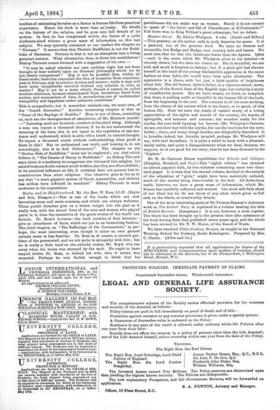Meadow Sweet. By Edwin Whelpton. 3 vols. (Smith and Elder.)
—This pastoral, as the author calls it, truly deserves its name. It is a pastoral, too, of the genuine kind. We have no Damon and Amaryllis, but Hodge and Madge, true country lads and lasses. We must own that we like the landscape better than the figures. Iphia —such is the name which Mr. Whelpton gives to his heroine—is cleverly drawn, but she does not charm us. She is beautiful, we are told, and much is forgiven to beauty ; but if a plain girl had thrown herself at the head of the young blacksmith's apprentice in the same fashion as does Iphis, she would have been quite intolerable. The apprentice is a clown, with but just a faint sparkle of brightness about him. The old farmer, Iphis's father, is a vigorous sketch, more, perhaps, of the Scotch than of the English type, but certainly a study of considerable power. But we have reason, we think, to complain that there is nothing noble or beautiful in the human life of the book, from the beginning to the end. The contrast is all the more striking, from the charm of the nature which is the frame, so to speak, of this human life. Here we have the result of careful study, of a loving appreciation of the sights and sounds of the country, the beauty of springtide, and summer and autumn ; the meadow ready for the scythe, the corn-field ripening for harvest (Mr. Whelptoa's farmers, we see, out their hay with the scythe, but use the machine for the corn- fields) ; these, and many things besides, are delightfully described. It is Arcadia, indeed, but Arcadia peopled, perhaps Mr. Whelpton will say, with real Arcadians. It is quite a relief to meet with a pleasant, manly sailor, and quite a disappointment when we hear, because, we suppose, he is too good for the story, that he has been drowned in the Captain.'














































 Previous page
Previous page